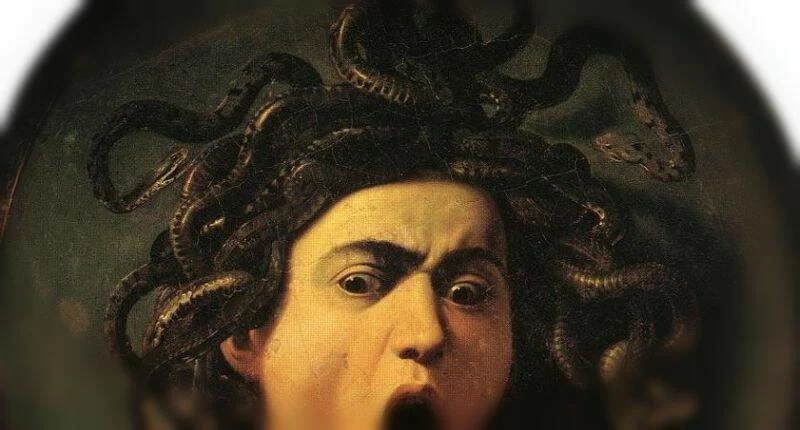In this installment of the Inferno Reading Journal, I muse on how Dante subverts our politics, critiques our stewardship of our resources, calls out heresy as a sin of reason, and employs the Medusa as an image of our sin.
Canto VI
“Their souls are among the blackest in Hell” (VI.76)
Except that we don’t take up arms as factions and oppose one another for power, I’m not sure the political strife of the present is so different than in Dante’s time. Politics and religion (or belief of any kind) still intersect and inspire fierce debates about the best way to organize ourselves as a society. Because politics can impact our social, material lives (or seems to), we are always in danger of substituting political zeal for faithfulness to the true God. Speaking to Ciacco, Dante asks after notable Florentine patriots, “worthy men . . . who set their minds to merit well,” only to learn that those political heroes are consigned to even deeper recesses of Hell. Maybe it’s easy to believe the other side’s politicians would wind up in Hell, but maybe we should remember that our own heroes deserve that, too—as do each of us individually.
Canto VII
The “Squinty-Eyed” and the Avaricious
As a consequence of being highly educated and choosing service-oriented careers, my wife and I carry a lot of student loan debt that we will continue to pay for a long time still. Each month’s budget entails questions of how much to save, how much to throw at loans, and how much to allow ourselves for date nights or family activities. Anytime one or the other wants some expensive new thing, even if it’s for work, we have to discuss whether and how much to spend. Plenty of people live on much less than we do and know this feeling of having to constantly think about money—as if we are already rolling those stone wheels.
Christians call the management of temporal goods “stewardship,” and we don’t pretend it is always easy. But Dante isn’t concerned with money difficulties so much as its vicious mismanagement (contrary to some theologies and politics,for Dante you don’t belong in Hell for being poor). The profligate and the greedy in Dante’s Hell are two sides of the same coin of useless activity, consigned to forever accusing their supposed opposites of error while participating in the same activity, viz., rolling the stone wheels.
Unique among the lost souls, these ones are indiscernible as individuals. Pinsky suggests they become identical in death like the coins they squandered in life, and Virgil compares this to their “undiscerning” behavior in life. That is, hoarding and wasting are both frivolous because they mean we don’t reason about how best to use our resources and then choose wisely; either default is an irresponsible position. I am reminded of Scrooge’s words to the charity gentlemen (his cheerful nephew present to offer ironic commentary) at the beginning of the Muppets’ Christmas Carol:
SCROOGE: I do not make merry myself at Christmas—
FRED: That certainly is true.
SCROOGE: And I cannot afford to make idle people merry—
FRED: That certainly is not true!
Scrooge doesn’t really withhold his donation because people are idle; that’s an excuse to justify his miserliness. The fact is that he never chooses to spend his money, and much of the point of Dickens’s tale is that even the poor can find joy and community when they spend what little they have on it.
Canto VIII
Filippo Argenti the Wrathful
What strikes me in this episode is how joyfully Virgil responds to the pilgrim’s disdain of his wrathful Venetian enemy and then how the pilgrim thanks God for the dead soul’s “[f]ierce mangling by the people of the mud” (l.56). We would consider this a lack of compassion to a living person, but in the hard logic of the afterlife Argenti suffers a just judgment for his unrepentant sinfulness while alive. Virgil even says Argenti was “[a]rrogant in his vice” while alive and that his soul remains furious in death because “[n]o goodness whatever / Adorn[s] his memory” (l.44-5). As we have seen before, the souls in Hell almost don’t even realize where they are, or at least they remain (willfully) mired in their sins and their blindness to ultimate things, worried still about earthly life. The pilgrim’s rejection indicates to Virgil that he is beginning to see with the godly perspective that loves justice fiercely.
Canto IX
Medusa and the “Veil of these Strange Verses”
We are not surprised that Virgil warns the pilgrim against looking at Medusa because we know the myth of how her gaze turns the viewer into stone. What is more surprising is how Dante loads the image with additional allegorical significance:
. . . . O you whose mind is clear:
Understand well the lesson that underlies
The veil of these strange verses I have written. (IX.54-56)
Pinsky takes these lines as a justification for allegory and as a lesson about interpretive authority, viz., that the incomplete or unperfected soul should not expect to see things directly, plainly, or clearly. So put, it suggests the perfected soul might be able to perceive truth without the need of interpretation. That idea has some currency in contemporary evangelical thought, but I find James Smith persuasive on this point when he argues that finitude is part of being human and that interpretation as such is not, therefore, a problem. It may be significant that Dante’s allegory encompasses the whole of spiritual experience: sinfulness, sanctification, and salvation. We might think that we’re familiar enough with our sinful state not to require allegory to see it, or, alternatively, that the pilgrim, purified by his journey, would perceive Paradise more or less directly, so that at some point in the poem Dante could dispense with allegory, but that’s not the case.
Instead, it may not be necessary to read this scene as a problem of interpretation and experience or authority but rather as several other possible meanings. For instance, it could be the allegorical epitome of sin itself. Mythologically, Medusa always represents a simultaneous attraction and repulsion; she is something one wants to see for the sake of knowing or experiencing, and yet one must resist for fear of one’s life. Similarly, we know sin leads to death and yet we seek out sinful experiences for their own sake. Or, Medusa could represent death, which cannot be literally known because it is the negation of the self that knows. Or, she could be an image of some other forbidden knowledge, which we might seek in sinful curiosity but that ultimately stuns the soul (see this article in First Thingsfor a description of the soul-crushing vice of acedia in relation to curiositas).
If I could be permitted a brief aside, here, it’s interesting to contrast what some see as the beauty/horror dynamic of Medusa with that of the Sirens. Odysseus survives the Sirens’ seductive and destructive song by having himself bound, but there is no obvious way to game Medusa’s magic. If it is appropriate to speak of her as beautiful, it must be in a different way than the Sirens’ song is—to the point that it may not be helpful to call the Medusa’s attraction “beauty” at all.
Canto X
The Heretics
Pinsky’s notes are helpful in explaining the unusual sense of time in this canto. Medieval theory believed heresy a “sin of the reason rather than the will,” and if understanding of the present means a negotiation of past and future, then the heretics’ lack of understanding is reflected in their blindness to the present, their inability to understand their moment in a temporal context.
This interests me first because I think most of us would now consider heresy a matter of the will. If you listen to William Lane Craig’s Reasonable Faith podcast, you’ll hear many examples of thoughtful people who can recognize the reasonableness of Christianity but seem willfully resistant to accepting it, determined instead to live consciously or unconsciously in a contradiction rather than bow to a higher truth.
At the same time, this medieval theory, despite creating a confusion in this canto that is lost on us in the 21st century, suggests something interesting about the contingency of reason as a faculty of concrete, finite, temporary beings. Understanding for Dante does not give one a view “beyond” or “outside” of time so much as a theory of time from within time (“theory” from the Greek theoria, “speculation”—and “speculate” from Latin specere, to look; thus, an observation or view in figurative senses similar to English). What we can know must be known precisely within our limitations, our finitude, and the awareness of my finitude is the beginning of my discovery that some other force must be at work in the world and, indeed, must be the explanation for the existence of the world at all. At least, it always seemed so to me, even from a young age.








Comments
Be the first one to make a comment!